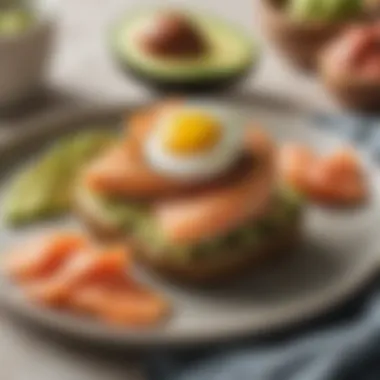No-Carb Breakfast Options for Keto Enthusiasts


Intro
In the current landscape of dietary practices, the ketogenic diet has gained traction for its potential benefits. Among its many facets, finding suitable breakfast options can present challenges, particularly for those aiming to maintain a no-carb approach. To navigate this, it is essential to understand what constitutes a no-carb meal. This article explores the depths of no-carb breakfast alternatives, emphasizing how to achieve this within the framework of a ketogenic lifestyle. With a focus on nutritional balance and practical recipes, we aim to provide foundational knowledge for those seeking satisfying breakfast solutions devoid of carbohydrates.
Recipe Overview
Breakfast Egg Muffins
A versatile and hearty option, breakfast egg muffins can be tailored with a variety of ingredients to suit personal tastes. These muffins are baked until fluffy, packing in nutrient-rich components that align with a no-carb diet. The convenience of these muffins extends beyond breakfast, offering ideal snacks throughout the day.
Ingredients List
- 6 large eggs
- 1 cup fresh spinach, chopped
- 1/2 cup broccoli florets, chopped
- 1/2 cup cheddar cheese, shredded (optional)
- Salt and pepper to taste
- Cooking spray or oil for greasing muffin tin
Step-by-Step Cooking Instructions
- Preheat your oven to 375°F (190°C).
Greasing the muffin tin ensures easy removal of the finished product. Use cooking spray generously or a light brush of oil. - Prepare the vegetables.
Wash the fresh spinach and chop it finely. Do the same with the broccoli, making sure to remove any tough stems. This will help them mix better into the egg base. - Whisk the eggs.
In a large bowl, crack the eggs and whisk thoroughly until the yolks and whites are well combined. Season with salt and pepper, adjusting to personal preference. - Combine ingredients.
Gently fold the chopped spinach, broccoli, and optional cheese into the egg mixture. Ensure that the vegetables are evenly distributed throughout. - Pour mixture into muffin tin.
Fill each muffin cup about 3/4 full to allow for rising. Overfilling may cause spillage. - Bake.
Place the muffin tin in the oven and bake for about 20-25 minutes. The muffins should be set and lightly golden on top. - Cool before serving.
Allow the muffins to cool in the pan for 5 minutes before transferring them to a wire rack. This mitigates any sticking and enhances presentation.
Note: These breakfast egg muffins can be stored in an airtight container in the refrigerator for up to one week, making them a convenient choice for meal prep.
Prologue to No-Carb Breakfasts
Breakfast is often touted as the most important meal of the day. For those following the ketogenic diet, the decision to opt for no-carb breakfast options can have significant implications for overall health and adherence to the dietary plan. Understanding how to create satisfying no-carb breakfasts is essential for maintaining ketosis, enhancing energy levels, and ensuring the right balance of nutrients.
Adopting a no-carb breakfast is not only about eliminating carbohydrates. It encompasses a thoughtful approach to ingredients, macros, and flavors. The no-carb philosophy allows individuals to enjoy meals while experiencing the benefits of fat adaptation and stable energy sources throughout the day.
Understanding the Ketogenic Diet
The ketogenic diet focuses on reducing carbohydrate intake while increasing fat consumption. This dietary shift prompts the body to enter a state of ketosis, where it becomes efficient at burning fat for energy. A no-carb breakfast fits perfectly into this framework, as it maximizes fat intake while minimizing carbs.
Key components of this diet include:
- High Fat: Fuels energy needs while suppressing hunger.
- Moderate Protein: Essential for maintaining muscle mass.
- Low Carbohydrates: Keeps insulin levels low and maintains ketosis.
By knowing these principles, one can more easily navigate creating no-carb meals that fit the keto guidelines.
Defining No-Carb Meals
No-carb meals can be somewhat subjective, but they generally contain very few or no carbohydrates. For the purpose of this discussion, a no-carb meal is one that contains minimal sugar and starch. Such meals typically rely heavily on sources like protein and healthy fats.
Examples include:
- Eggs: Rich in protein and fat, with virtually no carbs.
- Meat: Varieties like bacon and sausage add flavor and fat.
- Cheese: Provides a creamy texture without carbohydrates.
In the context of breakfast, defining no-carb meals allows for culinary creativity. It encourages the exploration of various cooking methods and ingredient combinations, leading to meals that are both enjoyable and nutritious.
Nutritional Considerations
When discussing no-carb breakfast options within the context of the ketogenic diet, understanding nutritional considerations stands as a pivotal element. This section addresses the necessity of balancing macronutrients and ensuring an adequate intake of essential vitamins and minerals. The unique structure of the ketogenic diet requires attention to detail in meal planning, which is especially crucial for breakfast as it sets the tone for the rest of the day.
Macro-nutrient Balancing
The ketogenic diet relies heavily on the manipulation of macronutrient ratios. The goal is to shift the body into a state of ketosis, where fat becomes the primary source of energy instead of carbohydrates. For most people, this means significantly increasing fat intake while keeping protein moderate and carbohydrates to a minimum. A typical distribution may look like around 70-75% fats, 20-25% protein, and only 5-10% carbohydrates.
Maintaining proper macro-nutrient balance is crucial for effectively entering and sustaining ketosis. If carbohydrate intake is too high, the body may revert to using glucose for energy, negating the benefits of the diet. Thus, incorporating no-carb foods like eggs, meats, and high-fat dairy can be beneficial. These foods contribute healthy fats and proteins while ensuring minimal carb content, aiding in appetite control and satisfying hunger more effectively than high-carb breakfasts could.
Essential Vitamins and Minerals


While focusing on macronutrient balance, it is equally important to prioritize the intake of vitamins and minerals. A no-carb diet can sometimes lead to deficiencies if not carefully curated. Feast on nutrient-dense foods such as leafy greens, fish, and nuts despite their low carb content. These foods can offer necessary vitamins like A, C, K, and a range of B vitamins, along with essential minerals like potassium, magnesium, and calcium.
To ensure adequate mineral intake, look to include foods such as avocados and nuts. Many of these also provide valuable electrolytes, an important consideration as sodium and potassium levels can fluctuate on a ketogenic regimen. Keep in mind that two distinct approaches can be taken: food first, supplemented as necessary, or using supplements directly, based on dietary preferences and lifestyle.
Nutritional considerations are not just about macronutrients; being mindful of vitamins and minerals in a no-carb breakfast is crucial for overall health.
In summary, a well-structured breakfast plays a significant role in maintaining a ketogenic lifestyle. Balancing macronutrients while ensuring an abundance of vitamins and minerals helps the body adapt to the no-carb structure, supporting both physical energy needs and overall well-being.
Impact on Metabolism
Understanding how metabolism interacts with diet is imperative for those following a ketogenic lifestyle, especially when it comes to breakfast choices. The importance of no-carb breakfasts lies in their ability to facilitate and maintain ketosis, a metabolic state characterized by the burning of fat for energy rather than carbohydrates. This shift can lead to improved energy levels, weight loss, and enhanced mental clarity.
How No-Carb Breakfasts Influence Ketosis
No-carb breakfasts play a significant role in promoting ketosis. When carbohydrates are minimal or absent, the body quickly depletes its glycogen stores. In response, it begins transforming fats into fatty acids and ketones for fuel. This process is the cornerstone of the ketogenic diet, making the selection of breakfast foods crucial. For example, including eggs and avocados, which are rich in healthy fats and protein while low in carbs, can provoke a favorable metabolic response.
The transition into ketosis can be accelerated by consuming very low carbohydrate meals first thing in the morning. Moreover, it sends a powerful signal to the body, reinforcing the switch from a carbohydrate-fueled metabolism to a fat-fueled one. This can be particularly advantageous for those looking to maximize fat-burning efficiency throughout the day.
"Adopting a no-carb breakfast can serve as a catalyst for achieving and sustaining ketosis."
Energy Levels and Cognitive Function
The influence of no-carb breakfasts extends beyond metabolism, affecting energy levels and cognitive function. When the body is in ketosis, ketones become a primary energy source. Many people report experiencing stable energy throughout the day without the crashes associated with high-carb diets.
Additionally, ketones have been linked to improved brain function. Unlike glucose, which can lead to fluctuations in energy, ketones provide a consistent energy source, which is especially beneficial for mental clarity and focus. This can lead to improved productivity, particularly during the morning hours when many start their day.
While individual responses to diet can vary, many keto adherents find that a focused no-carb breakfast supports both their physical and mental performance, leading to a more productive day ahead.
In summary, the importance of no-carb breakfasts in influencing metabolism is profound, touching not only upon weight management but also energy and cognitive function. Being conscious of ingredient selection and preparation methods is key to harnessing these benefits.
Practical Preparation Techniques
Incorporating no-carb breakfasts into a daily routine requires a clear plan for preparation. Practical preparation techniques can streamline the process and ensure meals remain both nutritious and satisfying. The significance of these techniques extends beyond mere convenience; they fundamentally support the ketogenic lifestyle by providing structure and predictability in an otherwise variable diet. By focusing on efficient meal prep strategies and effective cooking methods, individuals can avoid the common pitfalls of spontaneous eating, which often leads to unplanned carbohydrate intake.
Meal Prep Strategies
A successful ketogenic diet embraces meal prepping as a cornerstone for compliance and enthusiasm. When preparing no-carb breakfasts, consider the following strategies:
- Batch Cooking: Prepare larger quantities of breakfast items during a dedicated time each week. Dishes like quiches, frittatas, or egg muffins can be cooked in bulk and stored in the refrigerator.
- Portion Control: Divide finished meals into containers for easy access. This reduces the temptation to stray from the no-carb path.
- Plan Ahead: Make a weekly menu outlining meals. Knowing in advance what to prepare reduces decision fatigue and promotes adherence.
- Versatile Ingredients: Select ingredients that can work across multiple meals. For instance, cooked bacon or sausage can complement egg dishes or salads and offer flexibility throughout the week.
Employing these strategies can transform the morning routine by offering quick, ready-to-eat options that align with keto principles.
Cooking Methods for No-Carb Foods
Understanding the most effective cooking methods is key to enjoying diverse and flavorful no-carb breakfasts. The way food is prepared can greatly influence its taste and texture. Here are some recommended methods for no-carb ingredients:
- Frying: Utilizing healthy fats like olive oil or coconut oil, frying eggs or meats can enhance flavor. Crispy textures are satisfying and can make a meal more enjoyable.
- Baking: This method suits a variety of egg-based dishes, like quiche without crust. Baking also allows for even cooking, making it simpler to manage larger portions.
- Grilling: Ideal for breakfast meats such as bacon or sausage, grilling adds a new dimension of flavor. It also reduces excess fat because the grease can drip away during cooking.
- Slow Cooking: For those who enjoy hearty options, slow cooking can incorporate proteins like pulled pork or cooked sausages ready for breakfast. Prep in the evening for morning delectables.
These cooking methods will help maintain the integrity of no-carb ingredients while enhancing the overall breakfast experience.
Ingredient Selection
Selecting the right ingredients is crucial for crafting no-carb keto breakfast options. The choices made directly influence not only the success of adhering to the ketogenic diet but also the overall enjoyment of meals. Proper ingredient selection ensures that meals are nutrient-dense and satisfying while avoiding unwanted carbohydrates.
Protein Sources


Quality protein sources are fundamental in a no-carb breakfast. Protein is essential for muscle repair and satiety. Favorable options include eggs, which offer high biological value protein along with crucial vitamins. Other good sources are poultry, such as chicken and turkey, and fatty fish like salmon. Grass-fed beef and pork are also recommended due to their higher nutrient density and omega-3 content. Incorporating protein powder can augment protein intake in shakes or baked goods, allowing for a broader range of breakfast options.
Healthy Fats to Consider
Healthy fats play a pivotal role in achieving and maintaining ketosis. They provide the necessary energy while promoting a sense of fullness and satisfaction, reducing reliance on carbohydrates. Sources of healthy fats include avocados, which are rich in monounsaturated fats and fiber. Coconut oil and MCT oil can be easily integrated into various breakfast dishes, enhancing flavor and fat content. Additionally, using butter or ghee in cooking can add richness to meals without compromising carb counts. It is essential to choose fats that not only taste good but also support overall health.
Low Carb Vegetables
Including low carb vegetables in breakfast dishes enhances nutritional content without adding significant carbohydrates. Vegetables like spinach, kale, and zucchini offer vitamins, minerals, and antioxidants. These can be incorporated into omelets or smoothies for added health benefits. Other options such as bell peppers and broccoli can add texture and flavor to breakfast scrambles. Emphasizing these vegetable choices not only diversifies meals but aids in digestion and health.
"Ingredient selection is key in creating a fulfilling no-carb breakfast that supports a ketogenic lifestyle. Choices have wide impact."
In summary, proper ingredient selection is of utmost importance for those following a no-carb keto diet. Prioritizing quality protein sources, healthy fats, and low carb vegetables allows for a balanced breakfast that sustains both energy levels and nutritional needs.
Recipe Ideas
The significance of recipe ideas in a no-carb keto breakfast context cannot be overstated. These recipes serve not only as functional meals but also as a source of inspiration for those adhering to a ketogenic lifestyle. The primary aim of this section is to explore various recipe concepts that are both satisfying and low in carbohydrates. Here, we emphasize versatility and creativity, making it easier for readers to enjoy meals that are nutritious without relying on traditional high-carb ingredients.
Having a repertoire of no-carb recipes can improve dietary adherence while also providing pleasure in meal preparation. This can help break monotony and offer freshness in one’s diet. Recipes, especially breakfast ideas, act as a toolkit. They equip individuals with the means to craft meals that align with their ketogenic goals while remaining appealing and delicious.
Classic Egg Dishes
Eggs are often celebrated as a cornerstone of no-carb diets. Their versatility is unmatched, enabling a wide range of cooking methods. When considering classic egg dishes, options like scrambled eggs, omelets, and poached eggs stand out. They can be quickly prepared and customized with various seasonings and no-carb ingredients.
Benefits of Classic Egg Dishes:
- Rich in Protein: Eggs provide essential amino acids that promote muscle synthesis and satiety.
- Low in Carbs: A standard egg contains less than one gram of carbohydrates, making it an ideal choice for a no-carb breakfast.
- Nutrient-Dense: Eggs are packed with vitamins such as B12, D, and A, as well as healthy fats that support overall health.
To make a simple scrambled egg dish, whisk together eggs with a pinch of salt and pepper. Cook in a non-stick skillet over medium heat until fluffy. Topping with avocado can add a creamy texture without introducing significant carbs.
Smoothies and Shakes
While smoothies often resemble sugary breakfast beverages, there is room for creativity within the no-carb domain. Focused on using low-carb elements, these drinks can be both refreshing and invigorating. Incorporating ingredients like unsweetened almond milk, spinach, and protein powder creates a shake that is low in carbs but rich in flavor.
Considerations for Smoothies and Shakes:
- Ingredient Selection: Use low-carb bases as almond or coconut milk to keep the carb count down.
- Added Fats: Incorporating healthy fats such as coconut oil or nut butters can create a satiating drink that helps maintain energy levels.
- Flavor without Sweetness: Adding natural flavors like vanilla extract or cocoa powder provides taste without adding carbs.
A simple no-carb smoothie can be made by blending unsweetened almond milk, spinach, and a scoop of your preferred protein powder. This gives a nutritious drink ready in minutes.
Breakfast Meat and Cheese Combinations
The combination of meats and cheeses brings together two fundamental components of the ketogenic diet. High-protein, low-carb options such as bacon, sausage, or smoked salmon paired with cheese create satisfying breakfast experiences. The dynamic range of flavors and textures makes them delightful additions to any breakfast routine.
Benefits of Breakfast Meat and Cheese Combinations:
- High Protein Content: These ingredients support muscle health while keeping carbohydrate intake minimal.
- Flavor Variety: There’s a wide range of meats and cheeses available, allowing for customization in every meal.
- Easy Preparation: Many of these items can be prepared with little effort, making them accessible options for busy mornings.
Consider preparing a platter that combines scrambled eggs, crispy bacon, and slices of cheddar cheese. The combination not only nourishes but also delivers a fulfilling breakfast without the carbs.
"Creating varied meals can keep your ketogenic diet interesting and less restrictive."
Advanced No-Carb Breakfast Concepts
Advanced No-Carb Breakfast Concepts enhance the understanding of breakfast options within a ketogenic lifestyle. These concepts introduce innovative methods and ingredient choices, enabling individuals to stay within their no-carb dietary parameters while enjoying diverse flavors and textures. They also pave the way for meal variety, which can often be a challenge for those adhering strictly to no-carb eating.


Incorporating advanced concepts can elevate a breakfast from mundane to satisfying. This section explores two key areas: fermented and probiotic options, and dehydrated snack ideas. Each contributes unique benefits, ranging from gut health to convenient snacking.
Fermented and Probiotic Options
Fermented foods are significant for their various health benefits, especially when it comes to gut microbiome support. They contain live bacteria, which can aid in digestion and contribute positively to overall health. For those following a no-carb regimen, options like unsweetened yogurt, kimchi, or sauerkraut can be excellent additions.
Some specific probiotic-rich foods suitable for breakfast include:
- Greek yogurt: Choose plain varieties with no added sugars. It pairs well with a handful of nuts or seeds.
- Kefir: A drinkable yogurt that can be consumed on its own or combined with berries (limited amount).
- Fermented vegetables: Small portions can serve as a side dish, adding flavor and nutritional value.
Using these foods can improve digestion, supporting nutrient absorption and enhancing energy levels throughout the day. However, one must ensure that any fermented product maintains a low carbohydrate count.
Dehydrated Snack Ideas
Dehydrated snacks provide a unique approach to no-carb breakfast options, allowing for portability and ease of preparation. By removing moisture, the shelf-life is extended, and flavors intensify. While most dehydrated foods contain some carbs, certain options can still fit into a no-carb plan.
Examples of suitable dehydrated snacks include:
- Beef jerky: Opt for brands that use no sugar in the curing process.
- Cheese crisps: These can be made at home or purchased, offering a crunchy alternative to bread or crackers.
- Dehydrated veg snacks: Sliced zucchini or radishes, dehydrated without added sugars, can create a light and crunchy side.
The convenience of these snacks makes them appealing for busy mornings or as quick breakfast components. They provide a foundational layer of protein and fats while aligning with ketogenic goals.
Common Challenges and Solutions
Navigating a no-carb lifestyle presents various challenges that can deter individuals from committing long-term to ketogenic principles. It’s vital to address these challenges, as they directly influence dietary adherence and overall health. For many, sourcing quality ingredients and adjusting to a no-carb diet require both understanding and strategy. This section delves deeper into these elements, offering practical advice that aligns with a successful keto journey.
Sourcing Quality Ingredients
Choosing high-quality ingredients is crucial for anyone following a no-carb diet. The focus should be on foods that not only keep carbohydrate counts low but also provide adequate nutrition. Here are some points to consider:
- Choose Fresh Produce: Opt for organic, non-starchy vegetables like spinach, kale, and broccoli. These offer essential vitamins and fiber without raising carb levels significantly.
- Prioritize Grass-fed Meats: Grass-fed beef, free-range chicken, and wild-caught fish are preferred choices. They often contain higher omega-3 fatty acids, providing health benefits beyond basic nutrition.
- Look for Low-Carb Dairy: Cheese, butter, and cream can enhance meals; however, quality matters. Look for full-fat, minimally processed options.
It’s imperative to establish reliable sources for these ingredients. Farmers’ markets, local farms, and specialty stores can provide fresher options compared to standard supermarkets. Thus, investing time into sourcing quality products can significantly improve the eating experience.
Adjusting to a No-Carb Lifestyle
Transitioning to a no-carb diet can be an intense change. The following strategies may help ease this process:
- Gradual Transition: Instead of a sudden shift, gradually reduce carbohydrate intake. This method can help the body acclimatize without overwhelming cravings or side effects.
- Plan Ahead: Meal planning is essential. Prepare a selection of no-carb dishes for the week. This avoids impulsive eating and helps maintain a structured approach to dieting.
- Stay Informed: Understanding the science behind a no-carb lifestyle can motivate adherence. Knowledge about how the body metabolizes fats compared to carbohydrates reinforces its efficacy for weight loss and health benefits.
"Success in a no-carb lifestyle hinges on understanding both the ingredients and the dietary adjustments necessary for a smooth transition."
The End and Future Directions
The exploration of no-carb breakfast options specifically designed for discerning keto practitioners underscores not just the complexity of dietary choices but also the necessity of balanced nutrition. As individuals embark on a keto lifestyle, the commitment to eliminating carbohydrates from one's morning meal can initially appear daunting. However, with informed choices and understanding, it can evolve into a sustainable aspect of one's daily regimen.
Long-term Considerations of a Keto Lifestyle
Adopting a no-carb keto lifestyle can yield several benefits, including steady energy levels and improved cognitive function. Nevertheless, it is crucial to acknowledge some long-term considerations.
- Nutritional deficiencies may arise if the diet is not adequately managed. This scenario necessitates a focus on diverse food choices within the allowed parameters to ensure intake of essential vitamins and minerals.
- Monitoring one’s macro-nutrient intake becomes crucial. Without carbohydrates, one's diet must rely heavily on proteins and fats. The challenge lies in balancing these nutrients for sustained health.
- Psychological factors also play a significant role. The rigid nature of a no-carb diet may lead to cravings or a sense of deprivation. Therefore, incorporating occasional indulgences can help maintain mental satisfaction and adherence.
Ultimately, when managed well, the no-carb keto lifestyle can lead to long-lasting health benefits.
Further Resources for Implementation
For those interested in delving deeper into the no-carb keto breakfast options, numerous resources are available. The understanding of this dietary approach can be further enriched through expert literature and online communities. Consider the following:
- Books and Articles: Titles such as "The Complete Ketogenic Diet for Beginners" or scientific articles found on websites like britannica.com provide foundational knowledge and success stories from others on a similar path.
- Online Communities: Platforms like reddit.com host forums where individuals share recipes, tips, and personal experiences related to keto breakfast practices. Engaging in discussions can offer insight and support.
- Cooking Blogs and Videos: Many food bloggers specialize in low-carb cooking, providing visual guidance to simplify meal preparations. These resources can serve as inspiration for those seeking variety in their breakfast choices.
Remember, while transitioning into a no-carb keto routine can be challenging, countless tools exist to aid in making this lifestyle both practical and enjoyable.







